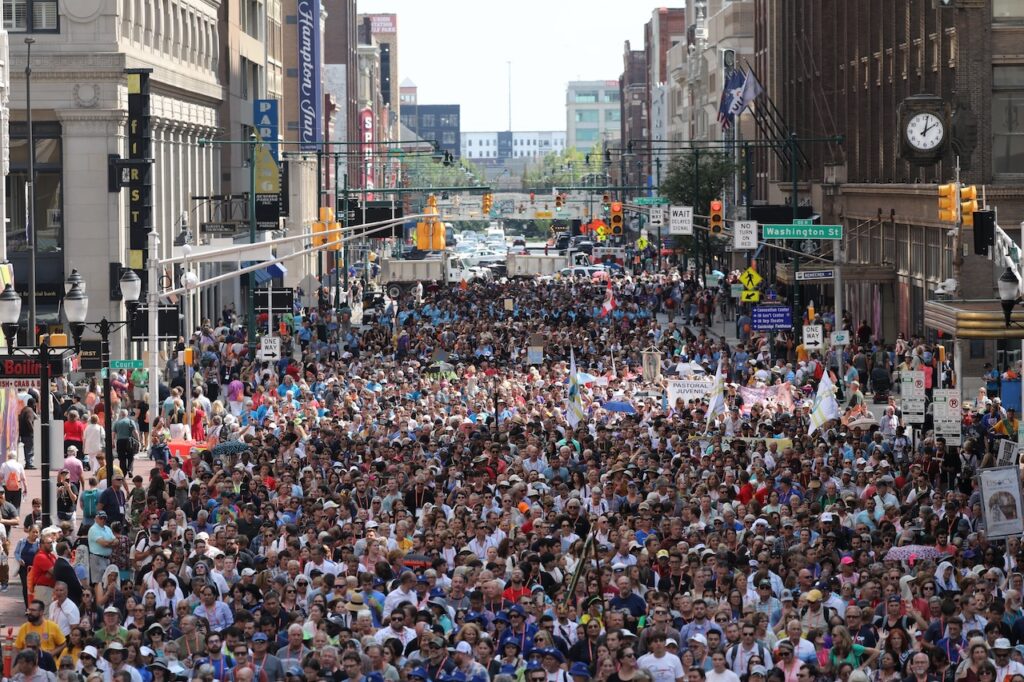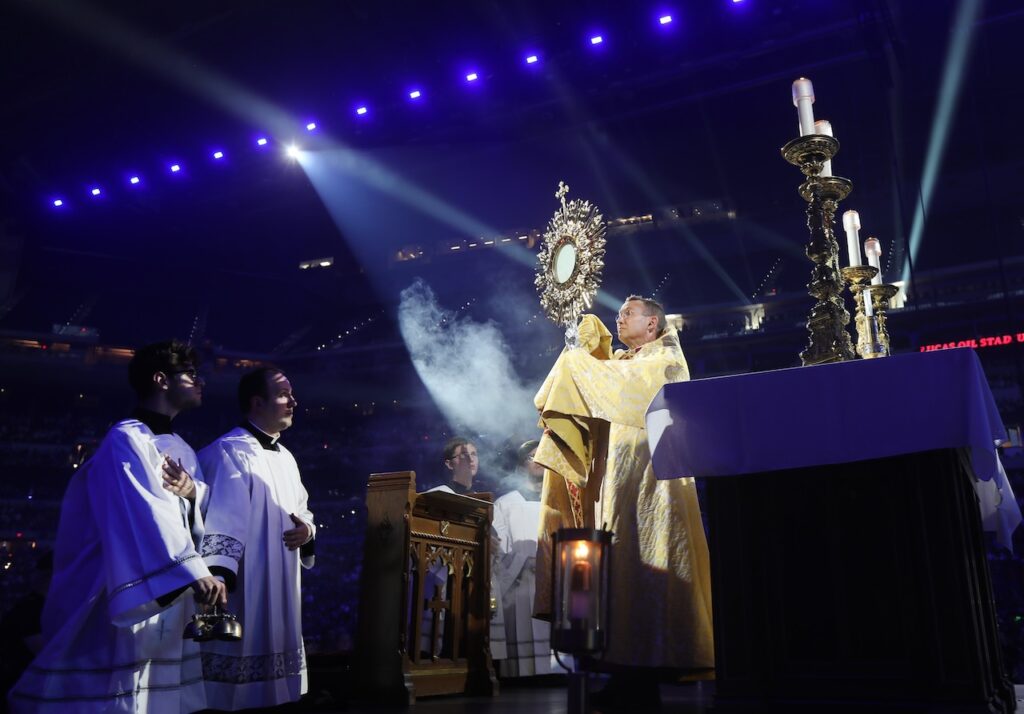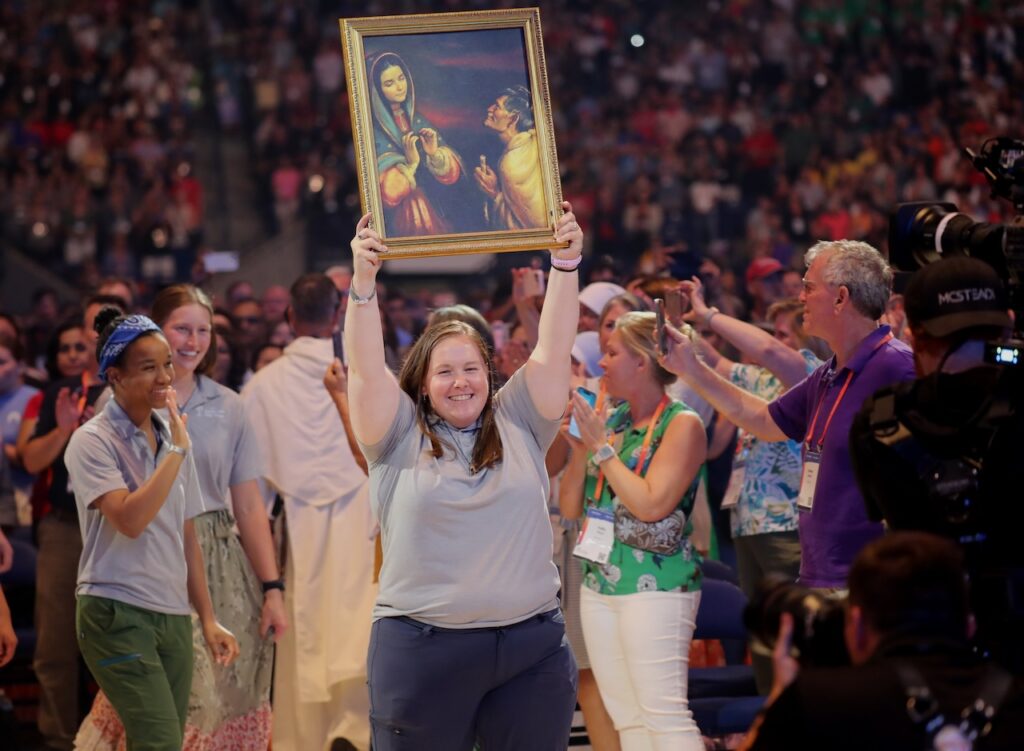(OSV News) — Kai Weiss is spending part of the summer in Krakow, Poland, helping college-age students immerse themselves in the thought and culture of St. John Paul II.
It is a role in which he would not have imagined himself prior to summer 2024, when he was a “perpetual pilgrim” on the inaugural National Eucharistic Pilgrimage.
The experience was life-changing, Weiss said, and well beyond his normal comfort zone. It has prompted his openness to other adventures God might be calling him to, as well as a surrender to trusting in God’s providence.
“I think the pilgrimage has radically changed pretty much every facet of my life, and I think it’s the best thing I’ve ever gotten to do,” he said. “There’s no day that passes where I don’t think about some kind of aspect, some kind of memory, some kind of person that I met along the way, or some kind of experience that I had with Jesus and the lessons that I learned there.”
As the 2025 National Eucharistic Pilgrimage ended its 10-state journey June 22 in Los Angeles, pilgrims on the 2024 routes reflected the impact of their experience a year later.
“Last summer profoundly impacted me for probably the rest of my life,” said MacKenzie Warrens, who recently finished a doctorate in physics from Rice University in Houston, which she aspires to somehow blend with a desire to do ministry and offer spiritual direction. “It’s hard to put into words the interior transformation that happened last summer.”

In January, the Missouri native professed promises as a consecrated virgin living in the world. She had already planned the date of the consecration before the pilgrimage, but her vocation was deepened over her eight weeks with the Eucharist.
“I really got to experience Christ’s spousal love for me,” Warrens said. “Like, any time we needed anything, whether or not we vocalized it, those needs were met” — from her secret cravings for mac and cheese to help with heat rash — as her team journeyed from the tip of Texas to Indianapolis.
“And oftentimes it was with hilarious excess,” she added. “People would love the Lord through loving us as well as they possibly could.”
While the five-week 2025 National Eucharistic Pilgrimage recently ended, last year’s 30 perpetual pilgrims traveled from mid-May until mid-July. Their four routes began at points in the nation’s North, South, East and West and converged in Indianapolis for the National Eucharistic Congress July 17-21, 2024. Along the way, the pilgrims stopped daily for Masses, Holy Hours, processions and other events, accompanied by the Eucharist in a specially made monstrance.
Both Warrens, 30, and Weiss, 29, noted that after spending so much time in Eucharistic adoration last summer, they no longer feel the need to use many words in prayer.
“It’s just a deeper gazing into the eyes of my beloved,” Warrens said.

For Weiss, who traveled the pilgrimage’s northern route, “before I was on pilgrimage, there was always the sense that when I’m in prayer, I have to do something — I have to read a book, I have to pray the rosary, I always have to be busy. … But the more time I spent in front of Jesus, the more I realized that I don’t have to do anything. It’s OK just to be in front of him, rejoice in him, also knowing that he rejoices in me for some miraculous reason.”
Weiss, a native of Germany who is finishing a master’s degree in theology at the Dominican House of Studies in Washington, said he does not know his plans beyond school, but the pilgrimage has taught him to trust in God’s providence and to be open to taking risks.
“There are ideas that I always had deep in my heart of what I want to do with my life, and I never dared to look at them because I thought they’re stupid or because I thought they were silly or because I thought they were impossible,” he said. Now, he has “this sense of Jesus just constantly saying, ‘Dare. Dare to ask for a lot,’ because I saw him do a lot last year in people’s lives.”
For a while, Weiss said he was “stuck … in a life of study” and while intellectual pursuits are good, he added, after the pilgrimage he feels more oriented to others. “I want to concretely meet people where they are at, and I want to serve them in whatever way God is calling me to do.”
That attitude influenced him accepting an invitation to head to the Diocese of Green Bay, Wisconsin, for a July 9-13 Eucharistic pilgrimage, and then to Rome in late July for the Jubilee of Young People.
“A lot of my life pre-pilgrimage, both in prayer and, in a way, in my relationship with God, the decisions I made were based on fear and hesitation to do anything out of the ordinary. The pilgrimage changed that because the pilgrimage was so crazy,” Weiss said. “Giving that ‘yes’ to him (God) last summer … there’s a sense of … I can do anything because he rejoices in me and invites me into a Chrisitian life of adventure.”
In May, the Franciscan Friars of the Renewal brought last year’s perpetual pilgrims together in New York for a retreat. The friars served as pilgrimage chaplains in both 2024 and 2025. Zoe Dongas, a 2024 perpetual pilgrim who traveled the pilgrimage’s eastern route, continues to collaborate with the friars as part of her music ministry in New York.
Dongas works for a Catholic arts apostolate in New York called Arthouse2B, and she also leads music at her Greenwich Village parish for an evangelization night called NightFire, which invites passersby to stop in the church to light a candle.
“What the pilgrimage experience for me was this experience of getting to unite the (musical) gift with a desire to pray and a desire to give it all to God,” said Dongas, 26, “and how do I culture that in a group of people, so that our first focus is prayer and not (just) a beautiful performance.”
She said that the pilgrimage gave her a glimpse into the many ways people live out their faith, both in sacred and secular spaces, which “has really inspired me to explore where God is asking me to be creative and be an artist in the world — both in the Catholic world, and also in my own kind of private practice.”
Weiss said that the pilgrimage also helped him to see that “evangelization is a lot simpler than we often make it.”
“The whole goal of last summer was to just invite people to come encounter Christ’s love in the Eucharist,” Weiss said. “It was so simple but so incredibly powerful.”

